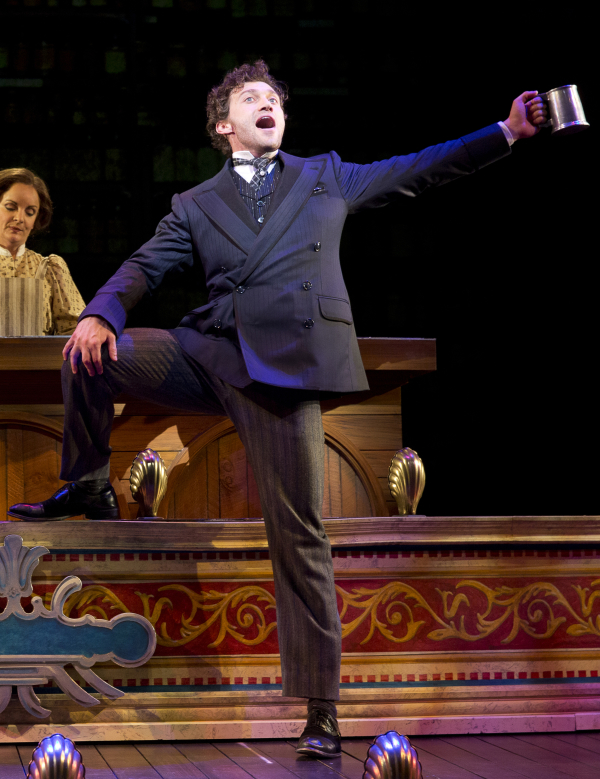Why Bryce Pinkham Ditched His Lead Role in Gentleman's Guide to Join the Heidi Chronicles Cast
The Tony nominee reflects on hard choices, transition, and the gay-best-friend motif.
When Bryce Pinkham was offered a starring role in the first Broadway revival of Wendy Wasserstein's The Heidi Chronicles, he faced a tough decision. Accepting the iconic role (which won Boyd Gaines his first Tony) would be a given for almost any actor, but Pinkham was currently enjoying a long run in the leading role he originated for the Tony-winning musical A Gentleman's Guide to Love and Murder. However, as actors Elisabeth Moss and Jason Biggs and director Pam MacKinnon attached themselves to the Wasserstein revival, the opportunity became too good to pass up. And, eventually, everything "timed out perfectly."
"I said, 'If I'm gonna do it, I don't want to leave Gentleman's Guide before I've enjoyed the fruits of our labor," explained Pinkham. "And thankfully, the dates ended up falling into place that [Heidi would] be around the New Year and I knew my body would probably need a rest by then anyway."
Though eventually returning to Gentleman's Guide remains a possibility, Pinkham knows he's "sort of handed [himself] over to the fates" by choosing to leave. But he's "comfortable with just taking one next step and not trying to predict three next steps." There's ambiguity in leaving all doors open, but, so far, the fates have treated him pretty well.

(© Jason Bell)
What about this role made you want to take it?
It's a challenge. I went to the Yale School of Drama to be in plays, and I started doing musicals in New York because that's a place I could get my foot in the door. I did musicals growing up as a kid, and it was always a dream to be in a Broadway musical, to play the lead in a Tony-winning musical. But I always knew there were other things I wanted to do as well — to do a play on Broadway these days, you kind of jump at that opportunity when it comes around. And the part is just fantastic. Peter is such a fun, such a sort of mischievous character to play.

(© Joan Marcus)
What do you connect with about the play?
The play for me, as much as it is about this woman finding her identity over the course of several decades…I think it's a play about two friends trying to sustain a friendship that started in high school through their professional and personal lives. That's a topic that I'm continually engaged in, how to keep those friendships strong — those people who knew me before anybody else did. And friendship is work — especially when people start having babies and getting married and moving away. It's really work, and I think Wendy was interested in investigating that in her play. The relationship between Heidi and Peter really sort of brings that to the forefront. Their relationship is so beautiful because they're perfect for each other, I mean they're essentially soul mates. They finish each other's sentences, they speak the same heightened poetic language, they make fun of the same things, they find the same things funny. And yet romantically, they just cannot be together. Of course, Peter finds out ten years into the play that he's gay, and that sort of shakes Heidi's foundation of what she thought was possible. Peter was always sort of the perfect backup plan. And this was in a time before there was the gay-best-friend motif. It wasn't a cliché. At the time it was written, it was really more about the fact that two people who are meant for each other can't be together, and so what do they do with that and how do they demand time and consideration from each other?
Their relationship does transcend the gay-best-friend motif.
There's this great scene where he comes out to her in a time when coming out was not even a thing. Nobody really had any rules of how to do it. Peter is sort of inventing the code on the spot. There is no template for this. It's just starting to have a feeling of possibility — something that didn't have to be done behind closed doors. It could be talked about, and it wasn't for two decades that it really got talked about. So he really doesn't know how it's gonna go. He could be losing his best friend by outing himself. And of course he doesn't. They sort of learn how to make their relationship new and how to work with the new circumstances and love each other through all of it. There are a couple times in the play [when] both of them have to choose to sort of dig in their heels and say, No, I'm not letting this go. She says through Peter's mouth, "In our lives, our friends are our families." And anyone in the theater really understands that. And I think a lot of people outside the theater, just in New York understand that, because it's true. My family's mostly in California and my friends really do become my family. They become the people I lean on, that I call late at night, that I ask, "Am I being an idiot about this?" And definitely for Peter and Heidi, that is the case. They have to choose, No, I'm not walking out on my family. I'm going to stay in this.
How has it been transitioning from Gentleman's Guide to this Pulitzer Prize-winning play?
Gentleman's Guide was always like the little musical that could, but we were all very shocked, amazed, and surprised at how it all turned out. We always knew it was good, but just knowing how Broadway musicals tend to fare these days, we were cautiously optimistic — but never more than that. So [acting in] a play that I know has been received well in the past, that's a new feeling from creating something that's very new. It comes with its own challenges because people are going to approach it with their memories of the previous version whether we like it or not. I don't mean that in a competitive way. This play affected a lot of people the first time they saw it, and I'm excited for those people to come back and to bring the next generation. This is a play that mothers should be bringing their daughters and their sons to.









